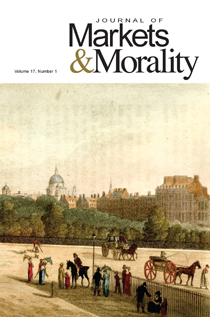September 05, 2014
Posts by Dylan Pahman
September 04, 2014
Notes on the Question of Inequality
September 03, 2014
Orthodoxy and Economic Liberty
August 28, 2014
Audio: Can Catholics, Orthodox, and Evangelicals Learn from Each Other?
August 27, 2014
Which Inequality? Trends Toward Equality in Lifespans and Education
August 20, 2014
Every Market Form in a Single Chart
August 14, 2014
Freedom of the Press and the Free Society
July 30, 2014
Consumerism, Service, and Religion
June 17, 2014
Journal of Markets & Morality on Journaltalk
As a new feature for the Journal of Markets & Morality, the folks at Journaltalk have helped us create discussion pages for the editorial and each of the articles of our most recent issue, vol. Continue Reading...

June 13, 2014
